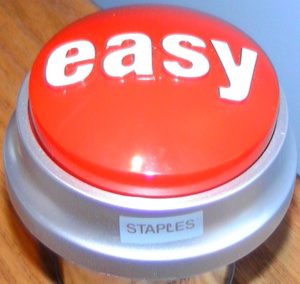When did you last change someone’s mind in one sentence? Can you remember a time when someone manipulated you in one sentence?
Do you see what I did there? I’ll explain in a minute, but suffice to say, I just tricked your brain into believing that persuading people to change their minds is hard. Of course, it wasn’t much of a trick if you already think persuasion can be hard.
Let’s see if I can persuade you that changing others’ minds as a public speaker can be easy!
The Availability Heuristic
 Social psychologists have known for decades that your brain takes shortcuts. When you look at the world and try to determine what is true and what is false, you take shortcuts.
Social psychologists have known for decades that your brain takes shortcuts. When you look at the world and try to determine what is true and what is false, you take shortcuts.
Sometimes you take lots of time to analyze the facts, but most of the time we trust what our instincts tell us. One of those instincts is called the “availability heuristic.” Basically it means this:
The easier it is to remember, the more true it is.
Of course that statement above is completely false. Lots of true things are hard to remember, and lots of easy stuff is false.
Nevertheless, if you don’t take the time to analyze the data thoroughly, your brain will always overestimate the value of whatever is easiest to recall.
In other words, if you want to take your public speaking prowess, presentation techniques, and persuasion skills to the next level, all you have to do is tap into “easy recall.”
Recall in Public Speaking
Example 1
At the beginning of this article I asked you “when did you last change someone’s mind in one sentence?” With few exceptions, chances are that nothing came immediately to your mind. I made the question hard on purpose.
That phrase “in one sentence” makes it hard to recall a specific example. Therefore, since it’s hard to recall, I subconsciously reinforce the message that it’s hard to persuade.
Of course, unless you paused to actually think about it, it wasn’t persuasive either way. In a written blog, you may or may not have actually stopped to think. In a verbal presentation the speaker can encourage that thought with a pause.
Example 2
Think of the last news story you saw about a Buddhist terrorist.
Good luck. Of course there can be terrorists in all organizations, but because we see more news stories about Muslims, the availability heuristic leads us to overestimate the number of Muslim terrorists and underestimate the number of Buddhist terrorists.
Example 3
Think of the last time your significant other surprised you with a gift.
 One of two things just happened. One, if you immediately remembered a surprise gift, I just reinforced your positive opinion of that giver. Or two, if you couldn’t immediately remember a surprise gift, I just reinforced the label of “non-giver” on to the person you’re imagining.
One of two things just happened. One, if you immediately remembered a surprise gift, I just reinforced your positive opinion of that giver. Or two, if you couldn’t immediately remember a surprise gift, I just reinforced the label of “non-giver” on to the person you’re imagining.
Example 4
If I were Donald Trump and I were trying to make you think less of Hillary Clinton, I might say something like this:
What do you think is Hillary Clinton’s most important accomplishment as Secretary of State?
I would then give you lots of time in silence to try and think of one. Most Americans pay almost no attention to what the secretary of state does, and the end result would be that the vast majority of people couldn’t come up with a single answer.
The end result–subconsciously you start to feel like Hillary didn’t do anything. Of course, whether you like her or not, she did do something. Nevertheless, if you can’t recall it, it just doesn’t seem important.
Example 5
If I were Hillary and wanted to make you think less of Trump, I might say something like:
What’s the scariest thing you’ve heard Donald Trump say?
 Since Trump has been in the news non-stop for months, chances are everyone–even his supporters–can come up with a quick answer. The more answers you come up with quickly, the more likely you are to believe that Trump is “scary.”
Since Trump has been in the news non-stop for months, chances are everyone–even his supporters–can come up with a quick answer. The more answers you come up with quickly, the more likely you are to believe that Trump is “scary.”
Every politician, including Hillary has said “scary” stuff, but since Trump’s “scary stuff” has appeared recently in the news, it’s easier to recall and leaves the impression that there’s more of it and more import behind it. Whether or not that’s true is a debate for another blog.
In terms of persuasion, it doesn’t matter if your memory is true. It doesn’t matter if your facts are correct. It doesn’t even matter if he actually said what you remember. If you recall it, it feels important; it feels right; it feels true.
How the Persuasion Works
 The persuasion works because it’s not forced. When you ask someone for recall, you are not telling them what to think, they are self-persuading based on their own thoughts. The audience thinks they are drawing their own conclusions–which they are–and they have no idea they are being persuaded.
The persuasion works because it’s not forced. When you ask someone for recall, you are not telling them what to think, they are self-persuading based on their own thoughts. The audience thinks they are drawing their own conclusions–which they are–and they have no idea they are being persuaded.
My SpeechDeck Essentials public speaking skills card deck does not include this technique, since the “essentials” product focuses on just fundamentals. As an advanced technique, persuasive recall would be categorized as a method to “empower the individual” by giving “ownership” of the message.
When paired with a little bit of priming, you can ratchet the power of this persuasion even higher. As always, use your persuasion power only for good.
Step-by-Step Instructions
Step 1
Identify the emotion or thought you are trying to create in your target audience.
Don’t be afraid of flying
Step 2
Brainstorm four types of memories: 1) EASY-to-recall memories FOR your argument, 2) HARD-to-recall memories AGAINST your argument, 3) HARD-to-recall memories FOR the counter argument, and 4) EASY-to-recall memories AGAINST the counter argument:
| Flying | Driving | |
| Safe | 1. EASY to recall | 3. HARD to recall |
| Unsafe | 2. HARD to recall | 4. EASY to recall |
STEP 3
Present the best options FOR your argument and AGAINST the counter argument:
How many people do you know that have ever flown on a plane (EASY)? Name everybody you know personally that’s actually been hurt in a plane crash (HARD)?
Do you know anyone that’s never broken a traffic law (HARD)? When was the last time you saw a crazy driver on the road (EASY)?
You don’t usually need all 4 sentences. One sentence may be enough.
Step 4
Pause after each request for recall and let the listener draw their own conclusions.
Easy Persuasion
So how can I convince you that persuasion can be easy? Just ask yourself:
Do you remember your first love?
Do you remember any Halloween costumes?
Do you remember eating escargot for breakfast?
Do you remember ever feeling sick?
Do you remember ever using the phrase “Do you remember …”?
Okay, so that was 5 sentences–pick one!
Every time you ask someone to “remember” you are persuading them to ascribe veracity to anything easily associated with that memory and less veracity to those hard associations.
Ask them to remember. It’s that easy!

